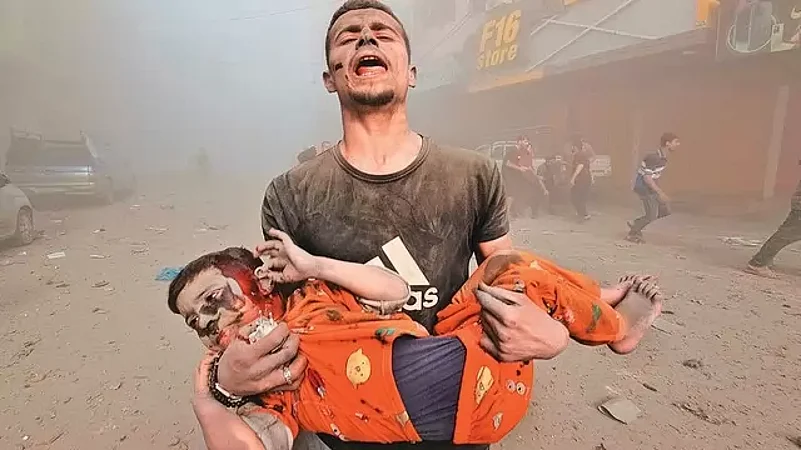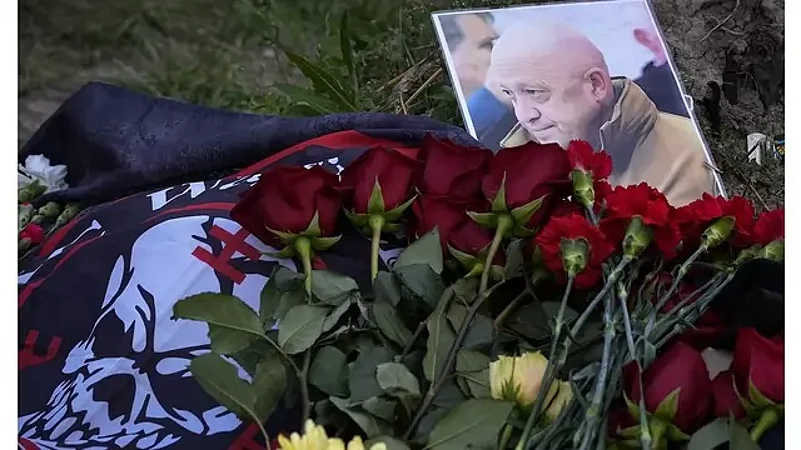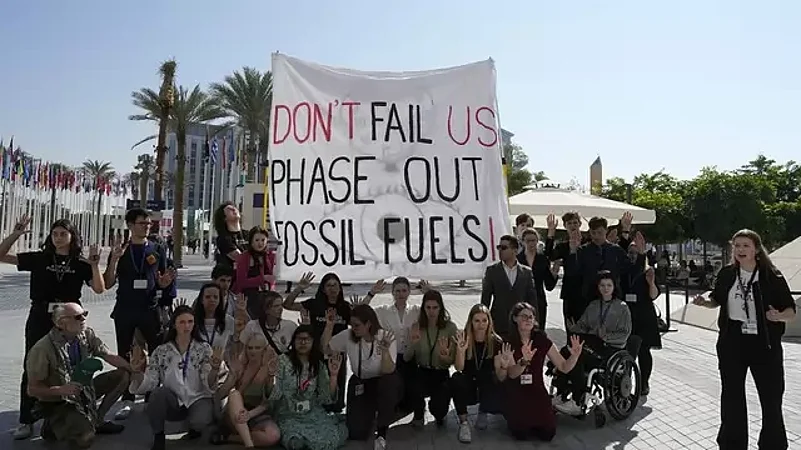Looking back at 2023, it was a year of devastations and landmarks globally. We celebrated the end of COVID-19 and scored a major historic deal in Dubai at COP28. But it wasn't all good news – we also saw heart-wrenching scenes from the Israel-Gaza war, the Sudan war, and millions dying because of earthquakes and other natural disasters.?
Israel-Gaza War, African Coups To Historic Climate Deal: Devastations & Landmarks That Made Headlines In 2023 | Recap
From devastating earthquakes in Turkey and Syria to Israel’s war on Gaza, here is the list of top news stories that defined 2023.

With Israel’s war on Gaza dominating the 2023 headlines, here is the wrap-up of top global stories of the year.
1. Israel’s War on Gaza

On October 7, the world woke up to see another chapter in the Israel-Gaza war as Hamas fired 5,000 rockets and breached the blockaded Gaza Strip, launching a surprise attack on nearby Israeli towns. Dozens lost their lives, and many were abducted.
‘We are at War,’ Israeli Prime Minister Benjamin Netanyahu said after the Hamas attack.? Israel surrounded Gaza from North to South, targeting schools, hospitals, and homes in an effort, they say, to eliminate Hamas.?
The war led to the loss of thousands of lives, including Israelis, Palestinians, and others. The toll has been devastating in Gaza, with more than 21,000 casualties so far—70% being women and children. Over 90% of Gaza's 2.3 million population has been displaced, where U.N. agencies say there is no safe place to flee.
Israeli attacks have been in close proximity to civilian infrastructure, including homes, healthcare facilities, schools and mosques.? According to the World Health Organization (WHO), the situation in Gaza is dire, lacking a functional hospital due to fuel shortages, staff shortages, and a lack of supplies.
This year saw protests from across the globe supporting Palestinian rights. These protests, with variations across countries and cities, shared common themes: They broadly condemn Israel’s military siege of Gaza, call for a ceasefire on all sides, and criticise US military aid for Israel.?
The war persists, the death toll continues to rise and talks for a permanent ceasefire remain in progress.
2. Democracy Failing in Africa, Two More Military Coups—Gabon and Niger?

The series of coups, coupled with the anti-Western cultural endeavours of some African states, have indicated that political dynamics are changing across the African Continent. Failure of democracy in Africa with anti-Western military actions saw two more coups in 2023.?
In July 2023, Niger faced a coup, quickly followed by another in Gabon, where the military took charge of the Central African state.
On July 26, the military in Niger ousted President Mohamed Bazoum, who tried to tackle terrorism in Niger with French help. The military leaders, appearing on national TV, claimed they were seizing power to address a "worsening security situation and poor governance."
Five weeks later, Gabon's army intervened, toppling the longtime civilian leader, Ali Bongo Ondimba, after a disputed election with irregularities.
Both Niger and Gabon were once French colonies.
One reason coups have grown more common is that many Africans have lost faith in democracy.
Weak democratic systems have let down countries in Francophone West Africa and the Sahel, leading to inequality, corruption, and fragile cultural agreements, say experts. Those conditions, in turn, attract paternalistic superpowers that are keen to extend their influence. This combination of economic, political and social challenges makes the region especially vulnerable to coups.?
Beyond insecurity and economic instability, a significant factor helping military takeovers is - growing anti-French sentiment. These uprisings and coups seem to have support from many civilians, fueled by the memories of French colonialism marked by military campaigns, forced labour, repression, cultural erasure, racial segregation, and displacement, which still lingers in the Sahel region.
Out of the 486 attempted or successful military coups carried globally since 1950, Africa accounts for the largest number with 214, of which at least 106 have been successful.
3. OceanGate Titan Submersible Implosion

In June, the world was gripped by the disappearance of the submersible "Titan". During a two-hour dive to explore the Titanic wreck, it lost contact with its support ship after only an hour and 45 minutes.
A massive international search involving US, Canadian, British, and French teams ensued. On June 22, the worst was confirmed — the submersible had suffered a "catastrophic implosion",? leading to the loss of all five people on board.
Among the passengers were Stockton Rush, the 61-year-old CEO of OceanGate, British-Pakistani businessman Shahzada Dawood (48) and his son Suleman (19), along with British businessman Hamish Harding (58). The fifth passenger, Paul-Henry Nargeolet, was a 77-year-old former French navy diver and renowned explorer.
These adventurers, known for their passion for extreme exploration, desire to collect Titanic artifacts and substantial wealth, each paid $250,000 for the ill-fated submersible trip. It was only the third journey to the Titanic since OceanGate Expeditions began offering them in 2021, and tragically, it ended in implosion.
4. W.H.O. Declared End of Global Health Emergency Designation for Covid

On May 5, after more than three years since COVID-19 was declared a pandemic, the World Health Organization (WHO) announced the end of the global Public Health Emergency (PHE) for COVID-19.?
“It is with great hope that I declare Covid-19 over as a global health emergency,” said the W.H.O. director general, Tedros Adhanom Ghebreyesus.
This marked a milestone in the long journey from a pandemic that has claimed millions of lives and completely changed daily life. As of May 2, 2023, the virus had reached nearly every corner of the world, causing over 6.86 million deaths. COVID-19's daily increasing cases and deaths led to worldwide lockdowns, quarantine and many other restrictions, putting everything to a halt.
The COVID emergency has officially ended but viruses don't follow government declarations. New variants of the coronavirus have emerged since then, with December seeing a rise in COVID cases, particularly due to a new variant called JN.1, first detected in the U.S. in September.
History teaches us that pandemics often have messy endings, with some resurging periodically.
5. Wagner Boss Prigozhin dead in Plane crash after a failed revolt against Putin

On August 23, 2023, exactly two months after staging a failed revolt against Russia's leadership, Wagner Boss Prigozhin was confirmed dead. He, along with nine others, lost their lives in a business jet crash in Tver Oblast, north of Moscow.
Wagner is a private Russian military company that operates for money rather than a specific country or cause. They've been involved in around 30 countries, including Syria and parts of Africa.
After Russia invaded Ukraine in 2022, the Kremlin embraced Wagner fighters in its ongoing war.
The trouble began when, on June 23, Prigozhin crossed Putin's red line by launching a mutiny, taking control of the southern city of Rostov and moving towards Moscow. This mutiny was considered the most direct threat Putin faced during his rule.
Putin went on television the next day to denounce the mutiny as a "stab in the back" and promised a harsh response. But within hours the revolt was defused with a deal: The Kremlin said that to avert bloodshed, Prigozhin and some of his fighters would leave for Belarus and a criminal case against him for armed mutiny would be dropped.
Despite the deal, many speculated that Prigozhin's rebellion would not go unpunished. A preliminary US intelligence assessment suggested the jet crash was intentionally caused. The Kremlin denied this, calling it an "absolute lie".?
Putin offered his sincere condolences to the families of all the victims who died in the Jet crash. "I knew Prigozhin for a very long time, since the early 90s. He was a man of complicated fate, and he made serious mistakes in his life, but he achieved the right results," Putin said.?
6. Devastating Earthquakes 2023; Türkiye, Syria, Afghanistan

A series of natural disasters unfolded globally throughout the year—seismic tremors, floods, wildfires, droughts, landslides, cyclones, and storms—resulting in widespread destruction and displacement.
Earthquakes in Turkey and Syria
On February 6, a pair of powerful earthquakes, measuring 7.8 and 7.5 in magnitude, struck southern Türkiye near the Syrian border. This seismic activity profoundly impacted approximately 14 million people, constituting 16% of Türkiye's population. The death toll from earthquakes in Türkiye and Syria has surpassed 50,000 people—including 45,968 confirmed deaths in Türkiye and 7,259 in Syria.
While earthquakes are not uncommon in this region, this event is noted as the largest and deadliest to hit Türkiye in decades. Imams conducted absentee funeral prayers for those who died, many of whom couldn't receive full burial rites. In Türkiye, 273,000 buildings have been destroyed. In north-west Syria over 9,100 buildings have collapsed, leaving tens of thousands of people homeless.
In the aftermath of the earthquakes, the U.N. Refugee Agency warned that over 5 million people in Syria may require shelter. Meanwhile, in Turkey, more than 1 million people found themselves homeless.
Earthquakes in Afghanistan
On October 7, 2023, Afghanistan was struck by a 6.3-magnitude earthquake, followed by numerous aftershocks. This seismic event stands as the most potent to hit the northwestern region of Afghanistan since 1978, as documented by the United States Geological Survey. The Ministry of Public Health in Afghanistan reported that, as of October 8, 2023, the earthquake resulted in over 2000 fatalities, with many more individuals sustaining injuries.
Scientists say these kinds of extreme weather events are expected to become more frequent and severe as the Earth undergoes warming trends.
7. Sudan War 2023; Mass displacement and death

In the heart of northeastern Africa, Sudan, home to 46 million people, has tragically become an arena for a personal war between rival generals. The war erupted in April, pitting two generals who led opposing military factions against each other, exacting a heavy toll on civilians.
The war, marked by clashes between the army and the Rapid Support Forces (a paramilitary group), transformed the country. Khartoum, the capital, bore the brunt of the devastation since the war ignited on April 15.
The army, with aerial capabilities, holds sway over much of Sudan, including Port Sudan. Meanwhile, the Rapid Support Forces fiercely contest for control over the capital, Khartoum, as well as the adjacent cities of Omdurman and Bahri.
The toll on civilians has been severe, with over 10,400 reported deaths by early November, and numerous others injured, according to the Armed Conflict Location and Event Data Project. However, Sudanese health workers suspect the actual toll is likely much higher. More than 6.9 million people have been displaced inside and outside Sudan since the fighting broke out.?
Sudan occupies a pivotal position on the African continent. It has a substantial coastline on the Red Sea, one of the world’s busiest shipping routes. It shares borders with seven countries — the Central African Republic, Chad, Egypt, Eritrea, Ethiopia, Libya and South Sudan — many also threatened by instability.
8. Pakistan carries out Mass Expulsion of Afghan Refugees

Hundreds of thousands of Afghan refugees have been forcibly uprooted from Pakistan Since mid-September 2023, as the interim government implemented an order to expel undocumented individuals within its borders.
Under its interim leadership, the Pakistani government set a stringent deadline of November 1 for individuals lacking legal documents—primarily Afghans and potentially asylum seekers from persecuted groups like China’s Uyghurs and Myanmar’s Rohingya—to either leave the country or face arrest and deportation.
According to the Pakistani government, approximately 4 million foreigners were in the country before October 31, with nearly 3.8 million being Afghans. Only 2.2 million Afghans possessed government-approved documents allowing them to stay.?
More than 370,000 Afghans fled Pakistan since Oct 1st. Among those being deported or coerced to leave are Afghans who were born in Pakistan and never lived in Afghanistan.
Islamabad attributed a surge in armed attacks within Pakistan to Afghan fighters and migrants, laying blame on them for recent years' unrest.
As Afghanistan's neighbour, Pakistan historically served as a destination for individuals seeking safety, spanning four decades from the 1979 Soviet invasion to the recent resurgence of the Taliban in 2021. The deportation policy faced criticism from human rights groups, including Amnesty International, which pointed out that because of considerable delays in the registration process, many new arrivals in Pakistan have not been able to obtain recognised identity documents.
Afghanistan’s interim Prime Minister Mullah Mohammad Hassan Akhund said Pakistan’s decision to expel refugees violated international laws.?
“You [Pakistan] are a neighbour, you should think about the future,” he said.
9. COP28 Dubai Historic Deal, Agreement to 'Transition Away' from fossil fuels

On 13 December 2023, the curtains fell on the COP28 with a historic agreement, the climate talks in Dubai ended in a historic deal?– a commitment to move away from all fossil fuels for the first time.
President Sultan Al Jaber of the United Arab Emirates, spearheading this year’s U.N.-sponsored summit, played a pivotal role in brokering an agreement that garnered support not only from the U.S. and the European Union but also maintained cooperation from major oil producers like Saudi Arabia.
The agreement calls for countries to swiftly transition their energy systems away from fossil fuels, introducing nuances that swayed sceptics. Instead of compelling independent shifts, the deal encourages nations to actively contribute to a global transition effort.
While not explicitly mandating a fossil fuel "phase-out" as some countries desired, the agreement marks a historic departure. It breaks new ground by explicitly mentioning the need to move away from oil and gas, the backbone of the global economy for decades.
"An agreement is only as good as its implementation. We are what we do, not what we say." —COP28 President Sultan al-Jaber.
10. Self-Exiled Former Pakistan Prime Minister Nawaz Sharif Returns Home?

Pakistan's thrice-elected former Prime Minister Nawaz Sharif returned home on October 21, concluding four years of self-imposed exile in London. His return is strategically timed as he endeavours to secure voter support for the parliamentary elections slated for January 2024.
Arriving on a chartered plane from Dubai, Sharif is poised to face stiff competition from the party of his main rival and former premier, Imran Khan. Khan, ousted in a no-confidence vote in April 2022, is currently imprisoned after a court convicted and sentenced him to three years in a graft case.
The former Prime Minister had been a fugitive since 2019 when he failed to appear before a Pakistani court following his conviction and a 10-year prison sentence on corruption charges. Initially allowed to travel abroad by Khan for medical treatment due to chest pains, Sharif extended his stay in London, citing doctors' recommendations against travel.
Despite his return, Sharif confronts multiple legal challenges. In 2020, an anti-graft court in Islamabad issued an arrest warrant, subsequently suspended until October 24. Another federal court granted Sharif bail until the same date, providing protection from arrest until then.
Two days before his return, a Pakistani federal court granted him several days of protection in graft cases, clearing the way for his return home from self-imposed exile in London.?
11. 2023 became the year of generative AI?

The year 2023 has been nothing short of a revolution in the realm of Artificial Intelligence (AI).?
Big players like Microsoft and Google played a key role in driving the AI wave, introducing powerful platforms. These AI chatbots have become versatile, handling questions, creating content, and even generating images. However, their effectiveness varies. Whether it's essays, homework, or any questions, AI has all the answers.?
Generative AI, especially in systems like ChatGPT, has impacted developer productivity. Notably, two AI programs, including ChatGPT, even passed the U.S. Medical Licensing Examination (USMLE).
While AI is advancing, it still falls short of matching human creativity. The technology's emergence in 2023 promised a transformative shift, boosting stock prices for embracing companies. However, AI, particularly chatbots, is not flawless, prone to inaccuracies and occasional missteps.
Wondering how far AI has come in 2023? To find out, let’s ask ChatGPT for a New Year wish for our readers.
May the coming year bring healing to the wounds of the past and pave the way for brighter days ahead. In the face of challenges, may resilience prevail, and in moments of triumph, may we find inspiration. Here's to a new year filled with hope, unity, and positive transformations. Thank you for being a part of our journey, and we look forward to bringing you informed and impactful stories in the year to come. Happy New Year!—ChatGPT
- Previous Story
 Marburg Virus Outbreak In Rwanda Leaves 11 Dead | All About The Deadly Ebola-Like Virus
Marburg Virus Outbreak In Rwanda Leaves 11 Dead | All About The Deadly Ebola-Like Virus - Next Story
























